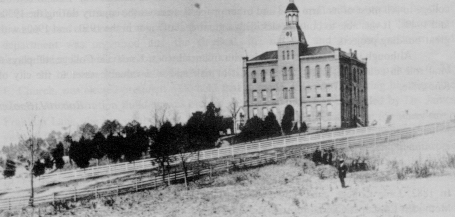KNOXVILLE COLLEGE (1875- )
Knoxville College was founded in 1875 by the Board of Freedmen's
Mission of the United Presbyterian Church. The church had started educational
missions among the freedmen in 1864, and they were located in Mississippi,
Louisiana, and Tennessee.

In 1872, Southern states passed legislation
to provide some form of education for black children. Since so few black
teachers were available, the church that year passed a resolution to discontinue
its missions and to concentrate all its educational efforts in a good normal
school to train teachers.
After a trip through the Carolinas, Alabama,
Mississippi, and Tennessee, the site selection committee was convinced
that Knoxville offered the best opportunity for such a school. It had a
healthful climate, good transportation facilities, and a fairly large black
population, as well as too few schools.
Dr. John S. McCulloch became the first president
of the Knoxville College in 1877. In order to have a supply of college
students, the school organized an elementary department and a high-school
department to feed the college department. It graduated its first two college
students in 1883.
In 1895, Knoxville College organized a medical
department to train physician Unfortunately, it never was properly staffed
or financed to carry on the work of an accredited medical school. It graduated
only two students in 1900 and closed later that year.
Knoxville College had more success with its
hospital, which opened in 1907. It was the only hospital within 200 miles
of Nashville or Atlanta where Black doctors and nurses could practice their
professions. Knoxville General Hospital did not accept black physicians
or nurses on its staff. When the Knoxville College Hospital opened, there
were only seven black physicians in the city; by the time it closed in
1926, there were twenty. It offered a modern setting for black patients,
who were treated in a basement ward at General Hospital.
The college discontinued its elementary department
in 1927 and the high-school department in 1931 to fully concentrate on
college work. College work, of course, included operating a large farm
and maintaining a dairy herd. The most popular department was perhaps the
music department with its various quartets and octets, which traveled extensively
to boost the recognition of the college.
The effects of the Great Depression and the
effects of World War Two forced the college to sell most of its farm land
and other properties across the country during the 1930s and 1940s. It
was able to bounce back with a great deal of vigor in the 1950s and 1960s
with great building projects.
Although it continues to struggle with financial
woes, Knoxville College still plays a vital role in educating those students
most at risk and is a valuable asset to the city of Knoxville.


